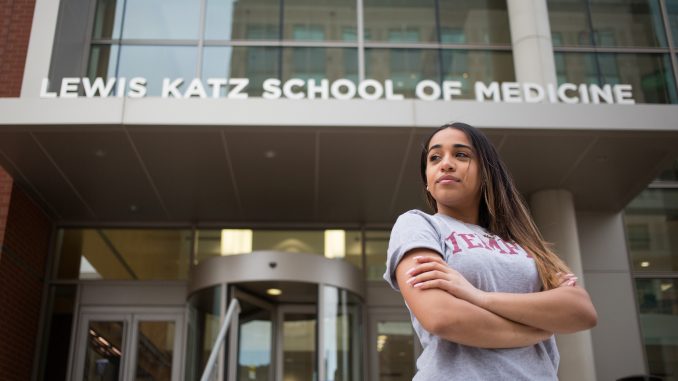
In middle and high school, Alexa Quiñones saw few other students that looked like her. When she came to Temple, she noticed the same problem in her chemistry and biology lecture halls.
“I realized that I hadn’t really come across any Latino students in any of my major courses,” said Quiñones, a senior health professions major. “It was always a struggle finding people that I could relate to.”
Quiñones started SALUD, Student Association of Latinos Unidos por la Diversidad, an undergraduate pre-health organization for Latino students on Main Campus.
Originating from the Spanish word “salud,” meaning health, the organization’s main goals are to increase Latino representation in various health fields, provide a safe space to promote mental health and assist students who may be struggling, Quiñones said.
“We want to unite the community on Temple’s campus that are pursuing health professions,” Quiñones said.
As a student juggling two jobs along with coursework, her first two years were lonely, she said.
“I was just so overwhelmed looking around and not having anybody that looked like me, not having anybody that I could easily relate to because it’s not very often you find a lot of Latino students pursuing health medicine,” she added.
Quiñones eventually found community in the Black Professional Health Association, but wanted a Latino organization for all health students at Temple. With the help of former BPHA president Brianna Spell, she began discussions about creating SALUD in Spring 2019, Quiñones said.
Only 6.2 percent of those accepted to United States medical schools during the 2018-19 school year were of Hispanic or Latino origin, according to the Association of American Medical Colleges.
Twenty-two percent of the Lewis Katz School of Medicine’s Class of 2021 are “underrepresented in medicine,” according to the school’s website. The Association of American Medical Colleges defines underrepresented in medicine as “those racial and ethnic populations that are underrepresented in the medical profession relative to their numbers in the general population.”
As of now, Quiñones said there are 15 students interested in the organization. She wants to host meet-ups where students can eat, study and check-in with each other, hoping to create a support system resembling family.
Melissa Alvarez, a junior health professions major who is working at Jefferson Frankford and Jefferson Torresdale hospitals, said she has not seen a Latino resident since she began in October.
“It would be so helpful to be surrounded by a group of people who are going through a similar experience,” she said. “Students of color, in general, have to work ten times as hard in a field that’s predominantly white.”
Quiñones hopes to have SALUD’s first meeting next month and plans to host a discussion panel as its first event in mid-March. The panel would be a question and answer style composed of students from various health professionals in both undergraduate and graduate schools.
Quiñones attributes the underrepresentation to Latinos viewing college as a “mountaintop” that seems unreachable and pessimistic about their chances of acceptance.
“I am lucky enough to have been raised in a home where education was the top priority,” she said. “I think a lot of Hispanic students don’t really have that mindset.”
Jordan Juarez, a first-year medical student and co-president of Lewis Katz School of Medicine’s Latino Medical Student Association, believes the addition of SALUD can help combat the “imposter syndrome,” or the intense feeling of inadequacy, that students face.
“I feel like there’s this myth that you need to be this perfect 4.0, leader of 10 clubs and have cured a disease to ultimately get into medical school,” he said. “That really got to me and I heard this from a lot of students as well.”
SALUD will also provide resources for professional and personal development by including a mentorship program to connect undergraduate and graduate students within Temple. They’re partnered with LMSA to connect students to graduate student mentors and Quiñones hopes to partner with more organizations from all health care fields.
“Such a big part of medicine itself is the idea of always teaching the next generation or the next class, but also learning from people who might even be just one year older than you,” said Arnav Shah, a first-year medical student and mentorship chair of LMSA.
Shah believes that having providers who look like the communities they serve increases communication between them and patients.
“It’s so important to have doctors who understand where you’re from, not in a literal sense of understanding, like where you can speak the same language,” Shah said. “But also just the cultural background that influences the way that you seek healthcare in the first place or how you think about health and wellness in general.”


Be the first to comment